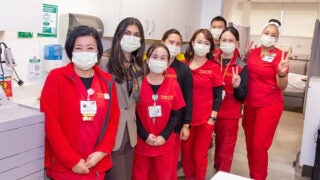
Using a USC-designed web tool to complete a cognitive test could help some people gauge the health of their brain. (Photo/iStock)
Alzheimer’s tool lets people 50 and older monitor their risk over time
Healthy people at increased risk of developing the disease could join clinical trials sooner, says director of USC therapeutic institute
An online tool that helps older people monitor their brain health has been developed at the Keck School of Medicine of USC with other medical groups.
The free website called the Alzheimer Prevention Trials Webstudy addresses a major obstacle to finding early Alzheimer’s treatments for a disease that affects more than 5 million Americans: significant delays in clinical trial enrollment.
“Alzheimer’s disease is a different beast from heart disease and cancer,” said Paul Aisen, director of the USC Alzheimer’s Therapeutic Research Institute (ATRI) in San Diego.
Researchers working on heart disease can go to doctors to find appropriate trial participants, but the people who will benefit most from Alzheimer’s disease treatments are healthy and have never seen a memory disorder specialist, he explained.
We’re incorporating innovations … to build a bridge between the problem and the solution.
Paul Aisen
“As a result, using traditional methods to recruit participants for Alzheimer’s clinical trials is far too slow and expensive,” Aisen said. “We’re incorporating innovations such as web-based assessments and establishing trial-ready cohorts to build a bridge between the problem and the solution.”
Clinical trials on promising drug treatments for Alzheimer’s have failed because patients were treated too late in the disease after irrevocable damage had already been done, Aisen said.
Researchers must evaluate experimental therapies in people whose Alzheimer’s symptoms are not yet obvious. That’s why the Keck School of Medicine, Harvard Medical School and Cleveland Clinic built an online research tool to direct seemingly healthy people at increased risk of developing Alzheimer’s into appropriate clinical trials aimed at preventing dementia.
Top risk factors for Alzheimer’s
The online platform allows people who are 50 or older to monitor their cognitive health over time. Participants create a profile that asks about personal health, educational history and exercise habits. These questions address the top risk factors linked to Alzheimer’s.
Among the main predictors for diagnoses of Alzheimer’s are age, family history of dementia, performance on cognitive tests and an individual’s sense of whether their memory has changed, said Michael Rafii, clinical director of USC ATRI and associate professor of neurology at the Keck School of Medicine.
Participants take a 20-minute brain test every three months. If their cognitive health begins to decline and their profile indicates they are at increased risk of developing Alzheimer’s, they can join a nearby clinical trial.
The website launched on Dec. 22. As of Feb. 27, 2,773 people had created profiles. The goal is to recruit at least 200,000 people over 50 to join the online study.
Moving Alzheimer’s research into fast lane
The Keck School of Medicine plays a leading role in the first two pre-symptomatic Alzheimer’s clinical trials in the world, Aisen said. He said it’s difficult and expensive to enroll people who have Alzheimer’s disease pathology in their brains but none of the symptoms.
“Our online tool will cut the price tag of early Alzheimer’s disease clinical trials by two-thirds because we won’t have to spend millions testing people who won’t develop Alzheimer’s disease,” Aisen said. “You wouldn’t give an eye exam to a blind person. Our online tool identifies people who would be good candidates for pre-symptomatic Alzheimer’s disease clinical trials.”
It took USC ATRI and its partners more than three years to recruit 1,150 participants for an Alzheimer’s clinical trial focused on people who don’t yet show symptoms. They administered 4,500 PET scans, spinal taps and other procedures to determine if the potential participants had an overabundance of amyloid plaques and tau tangles — protein indicators of future mental decline. The price tag for these procedures far surpassed $50 million, Aisen said.
“We aim to complete recruitment for early Alzheimer’s clinical trials in a matter of months rather than years,” Aisen said. “We’ve been moving far too slowly on developing new treatment options for Alzheimer’s. It’s time to utilize the latest technologies to accelerate the process. This free online tool does just that.”
USC ATRI is the San Diego branch of the Keck School of Medicine, which has faculty in Los Angeles working on a vaccine for Alzheimer’s. ATRI faculty and staff have worked on over 50 Alzheimer’s clinical trials and are currently involved in 14 studies, six of which are currently enrolling worldwide. ATRI is also home to the Alzheimer’s Clinical Trials Consortium, the National Institutes of Health’s flagship consortium for Alzheimer’s disease.
The Alzheimer Prevention Trials Webstudy is supported by a $24.7 million grant from the National Institute of Health’s National Institute on Aging. It is a collaboration with the Global Alzheimer’s Platform Foundation.



